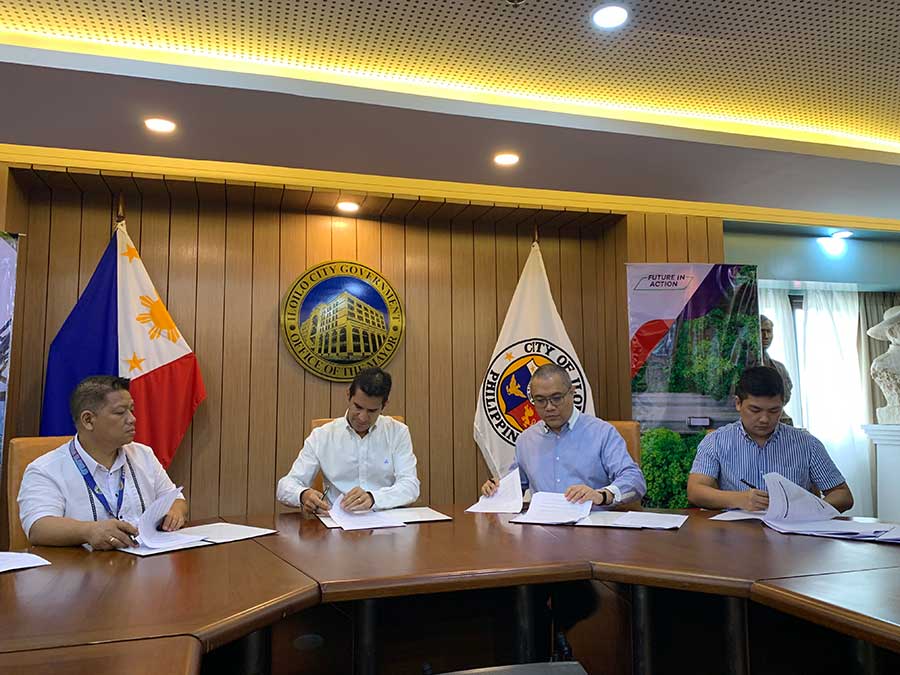
By Rjay Zuriaga Castor
With its mounting problem for low-density polyethylene or single-use plastics, the Iloilo City government is scaling up its solid waste management program with a partnership with Cemex Holdings Philippines Inc.
The city government and Regenera, the circularity solutions unit of Cemex Philippines, signed a Memorandum of Agreement on Tuesday, to help the former on its recovery, management, recycling and sustainable disposal and diversion of residual waste.
“Our intention is to try to increase the amount of waste that we receive. Every ton that is going to our plant is a ton that is not going to the landfills and I think that is a very good benefit to the city,” said Luis Guillermo Franco Carrillo, Cemex Philippines president and chief executive officer.
With the partnership, the city’s waste and industrial byproducts, particularly single-use plastics, will be used as sustainable substitutes for fossil fuels and natural raw materials in Cemex’s production processes.
“Sustainability is a very important priority for Cemex, there’s different things that we are doing to be at the forefront of sustainability […] One of the main leverages that we want to use is a circular economy. And this project is an example of a circular economy,” Carrillo added.
A circular economy disrupts the linear take-make-waste model, lessening waste and pollution while extending material and product lifespans. This approach brings several benefits, such as reducing the demand for virgin raw materials, decreasing carbon emissions, creating new business opportunities, and improving resource efficiency.
Carillo stressed that the project is a “win-win” situation, emphasizing that Cemex will compensate waste pickers with one peso for each kilogram of plastic waste they receive.
Neil Ravena, head of the City Environment and Natural Resources Office (CENRO), said the city is grappling with a plastic waste crisis that threatens the lifespan of the sanitary landfill.
“[These plastics of low-density polyethylene] ang potential very low value ang iya nga material. Wala siya sang use pero it constitutes 26 percent sang atun nga total volume of waste,” he explained.
The CENRO head revealed that the city accumulates around 400 tons of waste daily, with plastics comprising 26 percent of this total and if not properly managed or recycled, would result in the disposal of 90 tons per day of plastic waste in the city’s sanitary landfill.
He added that the project with Cemex will significantly help the city, especially on its “end-of-the-pipe ” material recovery system in the city-run Material Recovery Facility in Barangay Calahunan in Mandurriao district.
“It will significantly help us. They will get our plastics and the process is called co-processing. Gamitun nila nga gatung ang atun nga plastic sa ila nga cement factory,” he explained, emphasizing that the project is also in coordination with the Department of Environment and Natural Resources and the Environmental Management Bureau.
Co-processing is a method that transforms residual waste, such as end-of-life plastics, into alternative fuel for cement manufacturing plants. This fuel substitution avoids methane emissions generated at landfill sites and partially decarbonizes the manufacturing process.
Ravena said the city government will organize the USWAG Calahunan Livelihood Association Inc. (UCLA). The waste pickers of UCLA will be responsible for sorting and processing the recyclable materials. He added that two shifts will be implemented for efficient recovery of recyclable materials and to accommodate the schedules of the waste pickers and proceeds and sales generated from recycling will be distributed equally among the waste pickers.
On Monday, the city government also received a skid loader from the United States Agency for International Development through its flagship program in combating ocean plastic pollution, the Clean Cities Blue Ocean.
“We are very thankful to USAID for this logistical assistance. This will be a big boost to our pro-environment initiatives. Thank you for the partnership as we continue to provide Ilonggos with sustainable infrastructural developments and bring Iloilo City to the next level,” said Iloilo City Mayor Jerry Treñas in a statement.
The new skid loader promises a faster and more efficient sorting of materials in the MRF.
“This also means that our material recovery will be doubled and we will have higher compliance for waste diversion,” Ravena said.















